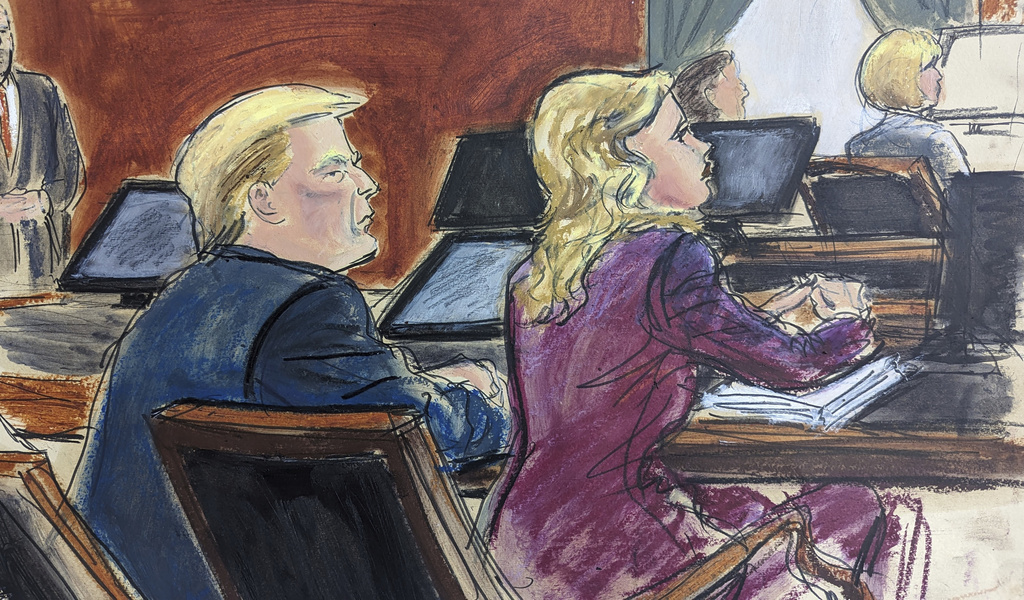
Former President Donald Trump plans to fight his $350 million New York civil fraud fine that will likely drag out the legal appeals process into next year and challenge how much the GOP front-runner must pay up.
The case stems from New York Attorney General Letitia James, who sued Trump, his two adult sons, Donald Jr. and Eric, the Trump Organization, and two firm executives, Allen Weisselberg and Jeff McConney, in September 2022. Presiding Judge Arthur Engoron found that Trump inflated his assets to obtain more favorable business loans ahead of a trial that began in October and lasted until early January, which was held to determine how much Trump and his adult sons would owe in damages.

Engoron concluded Trump would need to pay upward of $350 million in penalties. The former president, along with Weisselberg and McConney, is also banned from serving as an officer or director of any New York business or other legal entity in the state for three years, while his adult sons were ordered to pay $4 million apiece and are barred for two years.
The judge did hold back some of his ruling against the Trump Organization, deciding he would no longer dissolve the former president’s business empire. However, Trump’s business is barred for three years from applying for loans from any New York institution, and it remains a major question as to who in his orbit will attempt to manage the organization while a court-ordered monitor and independent director of compliance are tasked to ensure compliance with the law.
Now, Trump has less than a month to make his next move of appealing the decision in a process that could extend into 2025, according to legal experts. Here’s what to expect:

Attorney general threatens Trump if he doesn’t pay up
James has already begun threatening the former president if he does not pay the more than $350 million in fees to the state, saying she is prepared to seize his assets if he can’t pay the fine.
“If he does not have funds to pay off the judgment, then we will seek judgment enforcement mechanisms in court, and we will ask the judge to seize his assets,” James told ABC News.
Trump also owes around $100 million in additional pre-judgment interest after Engoron’s ruling from September found he inflated his net worth, which continues to gain interest each day he doesn’t pay, James has said. The amounts pile on top of Trump being ordered just weeks ago to pay $83.3 million to writer E. Jean Carroll for defamation after she accused him of sexual assault, and a separate jury last May awarded Carroll $5 million from Trump for sexual abuse and defamation.
Adding in amounts from other penalties and attorneys fees in separate cases, Trump could have to shell out more than $550 million to cover all of his civil court penalties.

What will be Trump’s main argument on appeal?
One of the former president’s main vehicles to appeal the massive judgment against him could be that the statute he was prosecuted under, New York’s business law Section 63(12), was not intended to apply to business transactions involving sophisticated financial actors, but rather for consumer fraud cases.
Former Assistant U.S. Attorney Andy McCarthy wrote Tuesday that Section 63(12) was not the only cause of action for the case, noting how Engoron “has now found against Trump on other claims that required establishing knowing, purposeful dishonesty.”
Kevin J. O’Brien, a trial lawyer and former assistant U.S. attorney who specializes in white-collar criminal defense, told the Washington Examiner he believed Engoron likely applied the statute as it was intended to apply.
“This is what 63(12) was for. It was meant to address systematic, widespread, fraudulent behavior over a lengthy period of time,” O’Brien said.
One point of agreement by O’Brien and McCarthy is that Trump could see success that he was subjectively targeted for the lawsuit that the state would not bring against a similarly situated defendant.
“I believe this is not credibly deniable,” McCarthy wrote for the National Review. He noted that Trump could argue that James campaigned on the promise that she would target Trump, that Engoron “intimated” that Trump was a “bad guy” even before the trial began, and that Gov. Kathy Hochul (D-NY) recently “pleaded with businesses, in essence, not to flee the state because the harsh treatment of this civil prosecution was uniquely meant for Trump.”
O’Brien said the appellate division could “look carefully at the judge’s conduct because of the obvious animosity between the parties during this.”
However, McCarthy noted that selective prosecution claims are “virtually never successful,” especially during post-trial appeals.
Attorney Andrew Lieb of Lieb at Law told the Washington Examiner he doesn’t think that Trump will succeed on numerous motions he may attempt to overturn the verdict but said he could fathom that Trump could succeed on the argument of the “damages being disproportionate.”
“They could say it’s a disproportionate damage because you have to show you can’t use speculative damages, you have to show the evidence supporting the damages, and problematic in this is how do you create causation between what occurred and the damages that were realized?” Lieb said.
“It’s kind of like an analogy: Everyone steals a pack of gum from the supermarket, but the supermarket charges more prices. And that’s how the people in the state of New York were injured,” Lieb explained.
As for the duration of the appeals court process, legal experts such as Lieb said that a typical appeal of a judgment this large could take anywhere between one or two years, while O’Brien said he estimated it could last until the end of the year due to a crowded schedule on the Manhattan court docket.
“I think in the ordinary course, it could easily take to the end of the year for this to be heard or a little longer. It’s not unusual,” O’Brien said.
Trump could seek bonds in the interim
The former president has already deposited $5 million owed to Carroll from the first defamation case into a court-controlled account, along with $500,000 in interest fees required under New York law. Trump could soon have to do the same with the $83.3 million judgment in Carroll’s separate case and in the civil fraud verdict, or he could secure a bond to pay only a portion of the damages plus their interest while he appeals the latter two decisions.
Regarding Lieb’s point about the disproportionate damages, O’Brien said it’s “common” for trial court judgments to be lowered on appeal even if a defendant fails to reverse a complete judgment.
“We’re dealing with loans that are so huge and over such a long period of time that you get to a pretty high number fairly quickly,” O’Brien said of the reasoning for how Engoron calculated the damages despite noting the overall damages were “pretty stunning.”
One way Trump could offset the hefty costs is to sell some of his properties or possibly obtain a windfall from when his social media company, Truth Social, goes public. Last week, the U.S. Securities and Exchange Commission allowed Trump’s media company to merge with a blank-check acquisition vehicle in a deal that presently values the parent Truth Social at as much as $10 billion, and Trump would own a 58.1% stake worth roughly $4 billion.
Following Engoron’s costly judgment against Trump, he made an unorthodox appearance at Sneaker Con on Saturday, during which he debuted his limited-edition “Never Surrender High Top” shoes retailing for $399, while one luxury watch dealer placed a bid of $9,000 to secure a signed pair. Although his shoe sales would hardly make a dent in the large legal bills he faces, the limited edition footwear sold out near-instantaneously, fortifying the notion that Trump’s name attachment to a product can draw mass appeal.
Separately, a GoFundMe started by social media influencer Elena Cardone, wife of billionaire private equity fund manager and entrepreneur Grant Cardone, has amassed more than $780,000 in donations.
CLICK HERE TO READ MORE FROM THE WASHINGTON EXAMINER
Trump, who is facing four criminal indictments as he seeks another run for the Oval Office, has prided himself on never personally declaring bankruptcy despite doing so on some of his previous business ventures. While campaign finance laws prevent him from using political donations to pay off civil trial judgments, legal experts pointed out that a large percentage of that money is already being used on his attorney fees for his criminal cases.
“I don’t think it’s going to lead to personal bankruptcy. I think it may create a liquidity crisis of some kind,” O’Brien said, adding, “He’ll be able to bridge that with financing of some kind, I would assume.”







